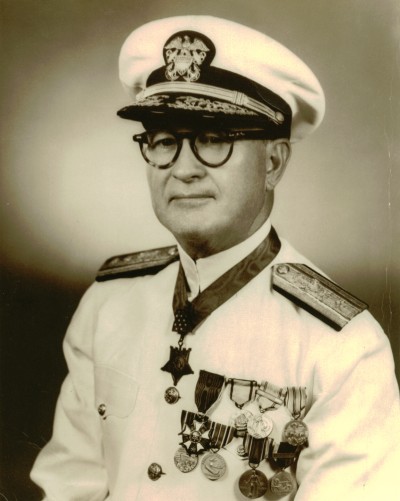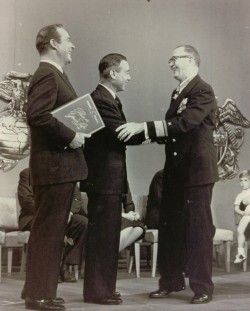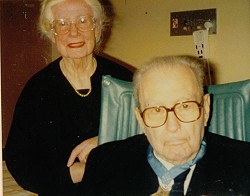
|
In Honor of
RADM Samual G. Fuqua |


"This Is Your Life" television
program honored RADM Fugua on Dec. 7, 1958. CDR Jim D. Miller,
USN was the surprise guest. |
R. Adm. Samual
G. Fuqua was born Oct. 15th, 1899 in Salt River Township (a
little town known now as Laddonia, Missouri). That territory was
then known as "Little Dixie" because all the people living there
in that vicinity were southerners who settled there after the
Civil War.
Admiral Fuqua's great-great-great-great grandfather was
Lieut. William Stark, First Continental Dragoons who fought
under General George Washington at Valley Forge, and the Admiral
is a member of the Society of the Cincinnati in the State of
Virginia.
On July 1, 1919 he entered the U.S. Naval Academy at
Annapolis, Maryland as a midshipman from Missouri. On June 8th,
1923, he graduated from the Naval Academy, and two weeks later
married his childhood sweetheart, Edna Agnes Hammett.
After graduation from the Naval Academy he was at sea for
seven years, attached successfully to the USS Arizona (his first
assignment was aboard the USS Arizona. 18 years later, he was
again attached to the USS Arizona, and was with her when she
went down at Pearl Harbor, Dec. 7th, 1941), USS McDonough, and
the USS Mississippi. He then served in Dist. Communication
Office of the Twelfth Naval District, San Francisco, California
from March 1930 through March 1932. |

Admiral Sam G. Fugua and his wife
Edna, March 1986
Wearing the Congressional Medal of Honor for heroism at the
sinking of the USS Arizona, Dec. 7, 1941. |
After that, he
did brief duty aboard the USS Hamilton and, on June 25, 1932, he
joined the Destroyer Ferry. He was then transferred in June 1933
to the USS Altair. He was there 2 years and then reported to the
Thirteenth Naval District Hdqtrs., Seattle, Wash., for a tour of
duty as Instructor of the Fifth Fleet Division,, USNR. at
Aberdeen, Wash.
In March 1937 he was ordered to the Destroyer Sqdn Five,
USS Peary flagship, and on Dec. 11, 1937, he assumed the command
of the USS Bittern, an auxiliary mine sweeper of the Asiatic
Fleet, and served additionally as Commander Mine Division Three
from June 21, 1938, until detached in Aug. 1939. From Sept. 30,
that year, until Feb. 7, 1941, he was assigned to the Naval
Training Center, Great Lakes, Ill.
He joined the USS Arizona as Damage Control Officer and
First Lieut. "For distinguished conduct in action, outstanding
heroism and utter disregard of his own safety, above and beyond
the call of duty during the attack of the Fleet in Pearl Harbor,
by Japanese forces on Dec. 7, 1941, was awarded the
Congressional Medal of Honor. The citation continues:
|
|
"Upon the commencement of the
attack, Lieut. Comdr. Fuqua rushed to the quarterdeck of the USS
Arizona, to which he was attached, where he was stunned and knocked
unconscious by the explosion of a large bomb which hit the quarterdeck,
penetrated several decks, and started a severe fire. Upon regaining
consciousness, he began to direct the fighting of fire and the rescue of
wounded and injured personnel. Almost immediately there was a tremendous
explosion forward, which made the ship appear to rise out of the water,
shudder, and settle down by the bow rapidly. The whole forward part of
the ship was enveloped in flames which were spreading rapidly, and the
wounded and burned men were pouring out of the ship to the quarterdeck.
Despite these conditions, his harrowing experience and severe enemy
strafing at the time, he continued to direct fighting of fires in order
to check them while the wounded and burned could be taken from the ship,
and supervised the rescue of these men in such an amazing calm and cool
manner and with such excellent judgment that it inspired everyone who
saw him and undoubtedly resulted in the saving of many lives.
After realizing the ship could not be saved and that he was the
senior surviving officer aboard, he directed it to be abandoned, but
continued to remain on the quarterdeck and direct the abandoning ship
and rescue of personnel until satisfied that all personnel that could be
had been saved, after which he left his ship with the last boatload.
The conduct of Lieut. Comdr. Fuqua was not only in keeping with the
highest traditions of the Naval Service but characterizes him as an
outstanding leader of men."
~Signed, Franklin D. Roosevelt
From Feb 9 until Dec. 22, 1942, he served as Damage Control
Officer and First Lieut. of the USS Tuscaloosa. Following brief duty at
Aruba-Curacao, Netherlands West Indies, and the Caribbean Sea Frontier,
he reported on June 6, 1943, as Commander Escort Vessel Administration,
Naval Operating Base, Guantanamo Bay, Cuba. July 1944 he was ordered to
the Naval War College at Newport, Rhode Island.
During the latter months of the war, Jan. to Aug. 1945, he was
assigned to the Staff of Commander Seventh Fleet, as Operations Officer.
He was awarded the Legion of Merit "For distinguishing himself for
exceptionally meritorious conduct (in that capacity) from Jan. 9 to Aug.
15, 1945". The citation states: "Exercising sound judgment and
professional ability, Captain Fuqua rendered valuable assistance in
preparing operations plans for long-range and complete amphibious
operations, and, in addition, was in large measure responsible for the
adequate supply and maintenance facilities provided for support of
amphibious landings in the South Philippine and Borneo areas. By his
excellent leadership and administrative ability, he contributed
materially to the success of our forces in this area..." and his conduct
thoughout upheld the highest traditions of the U.S. Naval Service.
~Signed, James Forrestol, Sec'y of the Navy
Next assigned to the Staff of Commander Service Squadron Seven.
He remained with the Service Force, Pacific Fleet until Jan. 1946, when
he was transferred to the Staff of Commander, Philippine Sea Frontier.
In July of the same year he was detached for duty on the Staff of
Commander Columbia Group, Pacific Reserve Fleet (nineteenth Fleet, until
May 1949).
In June he assumed command of the USS Dixie (AD-14). After a year
in that command, he reported in July 1950 as Asst. Chief of Staff for
Logistics, to the Commandant, Eighth Naval Dist. Hdqtrs New Orleans, La.
One year later, he became Chief of Staff to the Comdt. Eight Naval Dist
New Orleans, La. He remained there until his retirement became effective
on July 1, 1953.
In addition to the Medal of Honor and the Legion of Merit, R.
Adm. Fuqua has the World War 1 Victory Medal (Army); the Cina Service
Medal; American Defense Service Medal, Fleet Clasp; Asiatic-Pacific
Campaign Medal; European-African-Middle Eastern Campaign Medal; American
Campaign Medal; World War Victory Medal; Navy Occupation Service Medal;
Asia Clasp; National Defense Service Medal; and the Philippine
Liberation Ribbon with one Bronze Star.
Upon retirement from the Navy, June 1953, he was accepted as
graduate student to Stanford University at Palo Alto, California. He
received his Masters Degree in Political Science and Mathematics with
Teaching Credentials.
From 1957 to 1960 he taught math at Fork Union Military Academy in
Virginia.
From 1960 to 1969, Adm. Fuqua taught Political Science at St.
Petersburg College in Florida.
Retired again in 1969, he moved to Atlanta, Ga. where he and Mrs.
Fuqua lived with their daughter Pat and her husband Charles Leo Nagle
III, Comdr. U.S.N. Retired.
Three grandsons the Admiral's "pride and joy"---they are Chas. Leo
Nagle IV, Samuel Glenn Fuqua Nagle and Patrick Hammett Nagle. He also
had a great-grandson named Chas. Leo Nagle V, born Dec. 13, 1986.
Adm. Fuqua was always a champion for the rights of young people. At
Fork Union when the boys were being censored "for acting up" (unquote
the Adm.) he said, "Bear with these precocious youngsters, someday they
will be the MEN ON THE MOON" (unquote).
At that time, anybody thinking of our men on the moon was thought a
little "far out"; the Adm. always said we'd be the first ones [missing
text].
After World War II, there was the cry of "Soft American Boys". He
was asked to speak at New York Athletic Club and was still teaching at
Fork Union in 1958. He said this: "Don't ever let anybody tell you our
American boys are soft. I saw men on fire burning to death, and they
fought the ship 'til flesh fell off in our hands. Let us give young
people our full support, our guidance, and the benefit of our years of
experience. The swiftly changing world today and the hidden goals of
Communism make it ever harder to hold a steady course."
In 1981 Adm. suffered strokes. The family was able to care for him
at home for three years. Then he entered the V.A. Rest Home at V.A.
Medical Center where he received wonderful care.
On the afternoon of Jan. 27th, he passed away quietly in his sleep.
An Ecumenical Service was conducted here the following Saturday with
Catholic and Protestant Chaplains officiating. He was buried at
Arlington with Full Military Honors on Feb., 2, 1987.
Immediately after death, when every man stands in line and
"waits his turn", when "Papa's" number was called and he stood before
the Judge at that last great Mast, when his ledger was closed, there was
a loud and clear "WELL DONE" Samuel Glenn Fugua".
~Signed, Edna (mama) Fuqua |
Copyright © 2002-2018 Lorraine Marks-Haislip
|